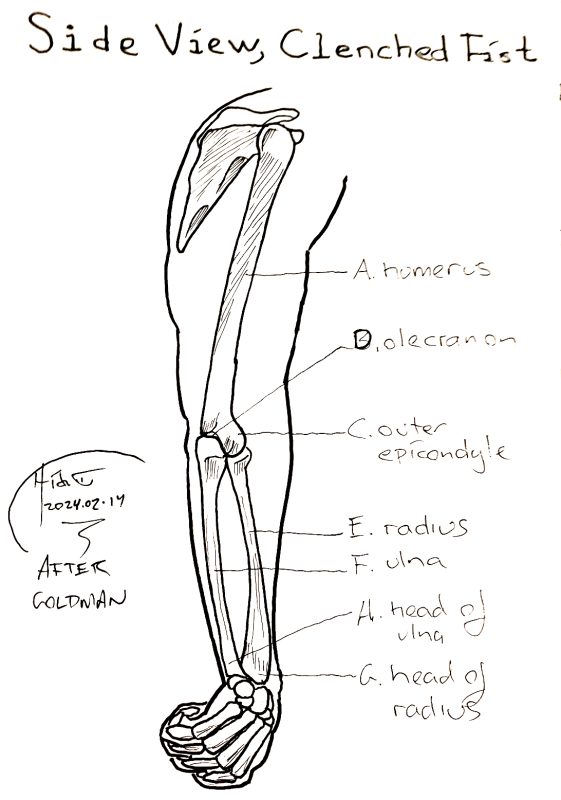
More drawing every day.
-the Centaur
Words, Art & Science by Anthony Francis

More drawing every day.
-the Centaur
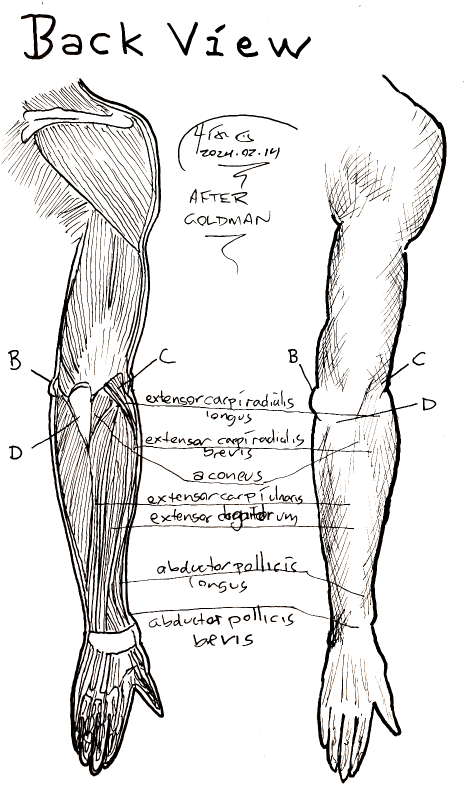
Again after Goldman. Drawing every day.
-the Centaur

When it rains, it pours. I missed a few meetings last week due to work on the Neurodiversiverse - we were working through edits, and needed more time, and decided to extend our meeting, ultimately taking three and a half hours. But I had an afternoon meeting I was supposed to schedule - we hadn't put it on the calendar yet, and were going to schedule it over email after my Neurodiversiverse meeting. But since that scheduling hadn't happened yet, I didn't see it on my calendar when we were deciding to extend the NDV meeting, and since that meeting didn't end for several hours, I completely missed the window my colleague and I were planning to meet in.
What's worse, I forgot what evening of the week it was, and completely spaced on the Vestry (church board) meeting scheduled for that night. I've added a recurring meeting for that, but the damage is done - and cascading. Since I missed that meeting, I missed the discussion at the Vestry meeting of when we were supposed to meet with the bishop - a retreat that I just found out is scheduled in just thirty minutes, when I had already booked this time to work on Neurodiversiverse edits, which are time urgent.
Sometimes I think it would be easier to be a cat.
However, I feel the need to point out that our capabilities often exceed our estimation of them. I was wondering how I was going to get everything done. Well, now, I am still going to get everything done - I'm just, somehow, going to do more than I thought I was capable of. Funny how that happens. We often imagine that we have less resources available to us than we do - this is an adaptive self-defense mechanism that keeps us from burning out. But it can make us feel that we can't handle things - when we can.
-the Centaur
Pictured: a cat, in comfort. Actually Loki had a very terrible, no good, bad night as he wanted out around midnight, right when I went to bed, and was forced to sit on his warm heating pad, unable to get crunchies for SEVERAL HOURS while his human slept. Imagine the injustice! When FINALLY let in, Loki went to every bowl in the house in turn, sampling each one, before finally settling down to warm and fuzzy sleep.
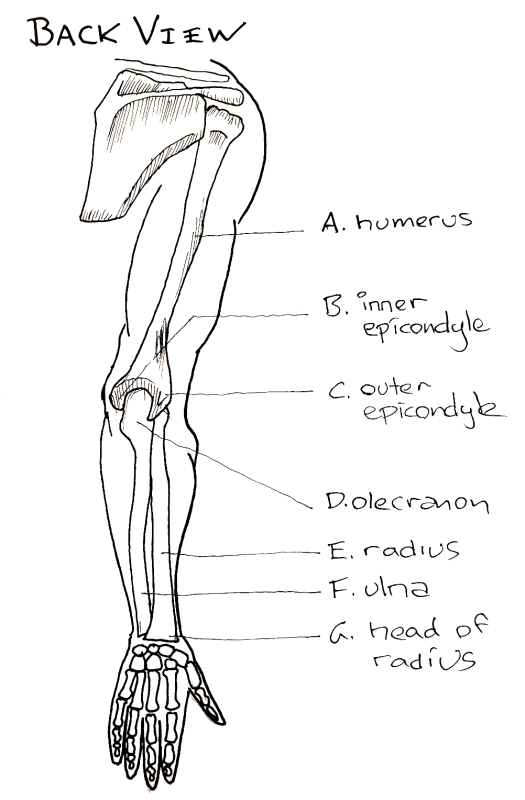
Moar moar arm anatomy, after Goldman.
Drawing every day.
-the Centaur
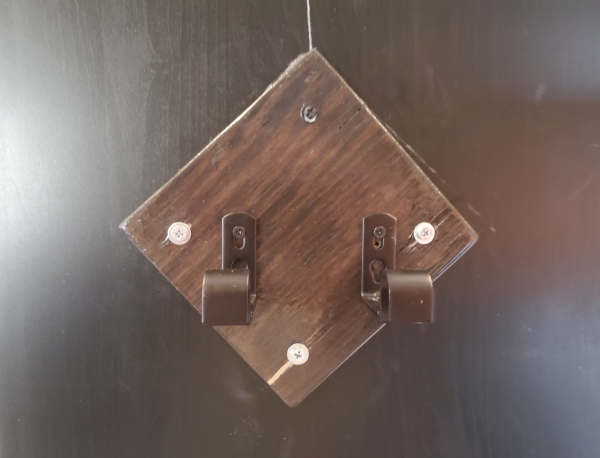
Back when I worked on-site, I used to keep a lot of genre toys on my desk - Oreius the centaur, a plush Cthulhu, a Star Trek Enterprise I used as a fidget - and I told myself that I was doing so to remind myself why I was working: not just to pay for food, clothing and shelter, but to pay for fun and entertainment.
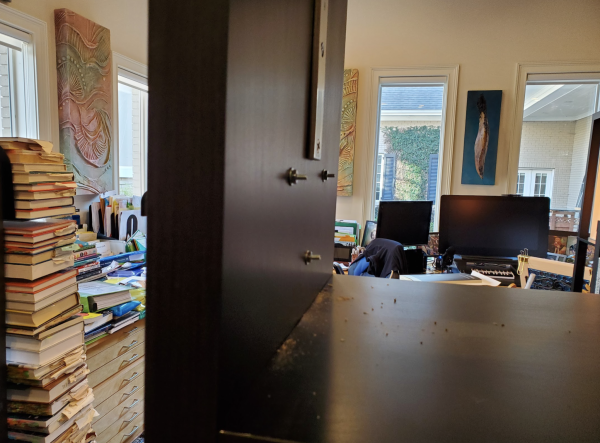
But I had too much stuff, too poorly organized, to the point that I didn't want to come home and spend time in my own library. It got ridiculous at one point. My wife and I talked about it and I took on the big project of turning the library into something that I could REALLY use, from organized files to library style aisles.
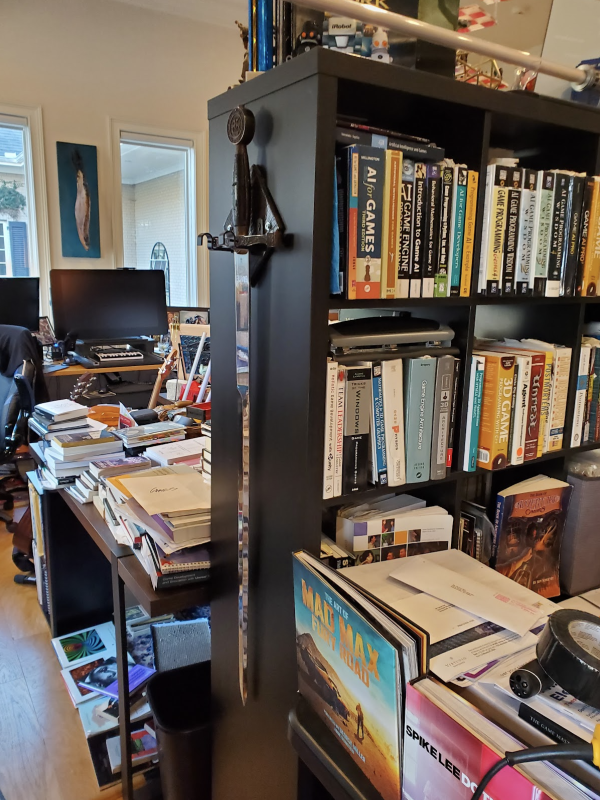
But also, it meant having a place for everything. If I was to own the genre toys, if I was to keep them, I needed to SEE them, not just store them, and, ideally, have them be a part of my day-to-day life. This meant crafting a space, and, ultimately, building custom structures which enabled the toys to go on display. This became even more urgent in the pandemic, where we built out a lot of structure to enable us to put almost EVERYTHING on display, down to Porsche's scythe hanging over my desk.

But, as I said before, after we moved away from the drought and the fires and the burning, we left the swords lying around and the hardware to hang them in the metaphorical junk drawer. It's easy to put self-care chores like this on the back burner, as they are not "urgent". And they're not even really "important", in the grander scheme of things. But they are fulfilling, on two levels: first, in that they make your environment nicer; and second, in that they involve making and building things, which is an accomplishment of its own.
Well, now, we have assembled the things that we made to make Excalibur and Kylo Ren's lightsaber an integral part of my environment. They are no longer easily visible behind me when I'm on Meet or Zoom, but they are at last up on display again. And one more piece of the library falls into place.
All I need now is to find the jade monkey, roadmaps and ice scraper before the next full moon ...
-the Centaur
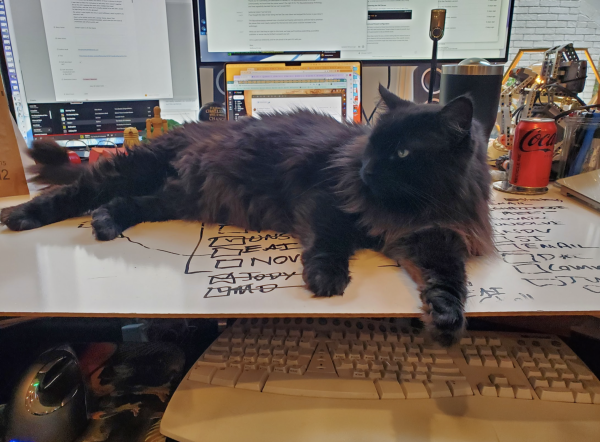
I do like the fact that Loki is spending more time in the library (especially while my wife is gone on a business trip, so he's been getting less attention due to having fewer attendants) but I sure hope that none of the things on my whiteboard desk were important TODOs, because they're TOSMEARS now.
-the Centaur
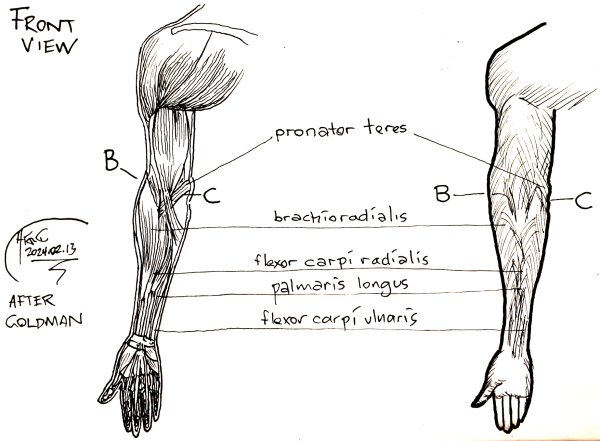
Again from Goldman. You know, I've noticed that in a sense I've become less ambitious this year: when I look back at the early DED posts, I see things like the following - Dad drawn on toned paper:
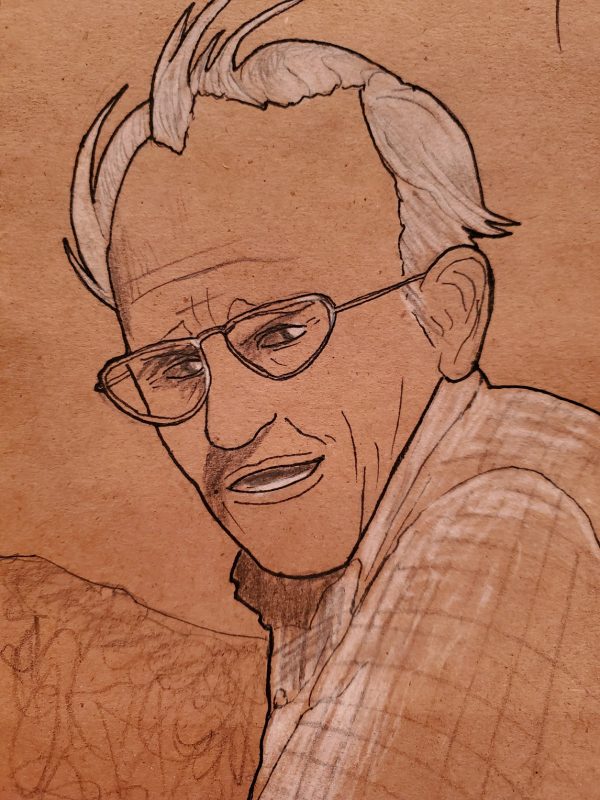
Or this, done on my Wacom Cintiq and Photoshop:

But the more methodical approach I'm taking this time seems to be having more effect on my drawing skill: I feel more confident about some of the things that I'm drawing, even if they are less ambitious.
So, I think I'm going to keep up the methodical approach and hope it goes somewhere! Wish me luck.
Drawing Every Day.
-the Centaur

So once again I'm taking something good on for Lent - continuing my series on "Jesus and Godel". To get started, I want to talk a little about the approaches that Jesus and Paul take to conflict.
Jesus reassures us a lot - he frequently tells us not to be afraid or to worry. But he also says that he's here to divide people from each other. Paul, in contrast, is an authoritarian: most of the rules that make up modern Christianity come from Paul - yet he admonishes us not to separate into factions.
These messages are actually complementary. Jesus is the messenger of truth, which on the one hand is nothing to be afraid of - but can cause conflict when people do not agree on the truth. Paul, on the other hand, suggests that we should not separate into factions because of our disagreements.
Jesus taught with authority, but Paul admits that sometimes he's speaking for himself - and both suggest that we should be peacemakers. We are fallible, which means that we can be wrong, and the people we interact with can be wrong - which can lead to division, as we stand up for what's true; but that fallibility means we cannot rely on our own authority, but must instead turn together towards Jesus.
I think these ideas are worth unpacking further - but, in the spirit of "drawing every day" and "blogging every day", I did not want the quest for perfection to get in the way of starting on the path towards it.
-the Centaur
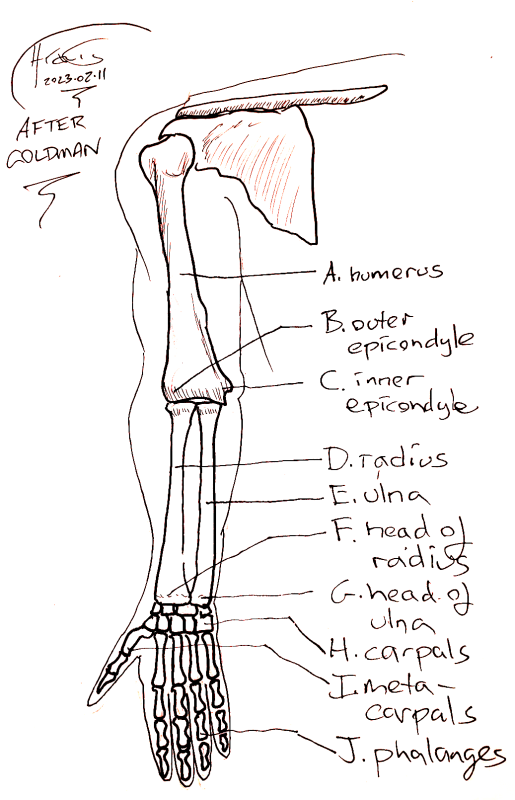
More Goldman studies.
Drawing every day.
-the Centaur

So back in the day (and on the Left Coast) I had a couple of swords mounted on my bookcases. We hadn't done that here because we were busy ... but two years is too long to be busy, so my wife and I decided it was time to set up the swords again, starting with the Kylo "Kylo Ren is Best Sith" Ren cross-lightsaber.

Only ... it ain't that simple. We had to buy new brackets as the previous ones disappeared in the move. We found those at Lowe's, but it turned out that we could not install the mounting diamonds as the old bookcases were solid wood and these were hollow - the screws would have pulled straight out.

Eventually we used bolts and washers and I was able to finish the installation after my wife left town.

A little duct tape and an old Amazon delivery bag protect the books in the case. There's only one problem:

Despite our careful measuring, it was not possible to make it both level (up-and-down) and even (side-to-side) at the same time. It may be that the bookcase itself is leaning (see the top of the previous picture) and since it is screwed into the bookcase next to it for stability, well, we're stuck with that.

Still, I like how it came out.
1 of 2. Next: Excalibur.
-the Centaur

I and a politically opposite friend got together today to NOT solve the world's problems, and after a long and charged discussion we came to the conclusion ...
... that the 55+ menu at IHOP is good.
I think we can come together as a nation on this one.
Seriously, just turned 55 recently, and my buddy offered to take me out to breakfast at IHOP and order off the "senior" menu because, well ... sigh. It's time, literally, it's time. And it was pretty good!
So we've got that going for us, which is nice.
"What's that, sonny? First time trying it? I can't hear you over my advancing decrepitude ... "
-the Centaur @ 55(ish, give or take a few days)
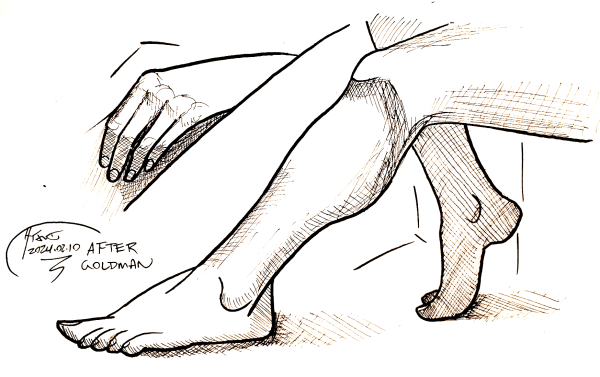
Still more Goldman studies. Drawing every day.
-the Centaur
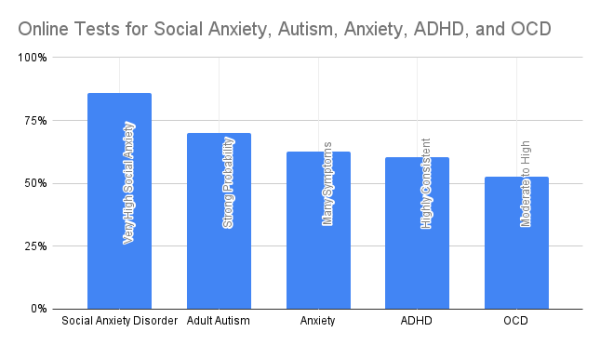
So! While working on The Neurodiversiverse I've been reading up a lot on neurodiversity. According to Devon Price's Unmasking Autism, autism is massively undiagnosed, and for good---well, understandable---reasons. From parents concerned about their uncommunicative children or fans of cold geniuses on Sherlock and the Big Bang Theory, our culture focuses a lot on certain stereotypes of autism---while ignoring a much larger group of people who suffer from the same underlying conditions in their brains, but who are able to "mask" their behavior to appear much more "high functioning" or even "neurotypical".
As you might imagine, spending your whole day trying to react in ways that are fundamentally unnatural to you---and trying to hide the ways that you react that are natural to you---can stress people the fuck out. But many people never get a diagnosis---either because they're from a disadvantaged group, or because they don't want to risk the stigma and potential negative consequences of a diagnosis, or because they mask too well and no-on notices how they are suffering. But if you don't understand your condition, you may employ coping strategies which may actually do more long-term harm than good.
Well, now there are a lot of online tests and self-help books and even sympathetic therapists who can help people understand themselves better. While I've always known I was a bit strange---mostly solitary, typically withdrawn at family gatherings when I was a child, or explicitly labeled as having a weird brain---I've never pursued a diagnosis of any kind---in the past, because I didn't feel I had any trouble coping to the point that I needed help, and in the present, because having a disability label attached to you can have negative social and legal consequences that I have no interest in dealing with.
BUT! The personal stories of Unmasking Autism resonated a lot with me, and I now have friends who have gone through formal adult diagnoses of autism and ADHD, as well as an undiagnosed autistic friend who clearly is autistic and has to manage her life the way a masking autistic person does, but who did not pursue a diagnosis for precisely the same reasons that many other masking autistics do not pursue it: unless your condition is very severe, it isn't clear that a formal diagnosis can actually get you help, and it can often get you a lot of hurt. But UNDERSTANDING it, that, that we can now do.
So! And I note I again use "So!" at the start of a paragraph. Is that a verbal tic? Who cares? SO ANYWAY ...
Diagnoses of autism, and other neurodivergences! The neurodivergence I identify most with is Social Anxiety Disorder---in fact, this is the neurodivergence I chose for the protagonist of "Shadows of Titanium Rain", my own submission to The Neuroversiverse. But other people have suggested I have characteristics of OCD, or ADHD, or Autism, and I even went into therapy for stress and anxiety during the pandemic. So I decided to take five online tests: Social Anxiety Disorder, Autism, Anxiety, ADHD, and OCD.
The results are at the top of the blog---and I already gave away the game through the order I listed them. Normalizing all the scores from zero to a hundred, most of the tests put the boundary of "you've got the thing" at somewhere around 60-70% of the possible points you could score - let's call it at 2/3, or 66%, shall we? OCD scored the lowest - roughly 53%, which the test judged as "you've got OCD tendencies, but not OCD." ADHD was a little higher, 60%, and general Anxiety still higher, 63%. But none of these were over the "you've got it" thresholds for these tests---they just indicated a general tendency in that direction.
Things start to change with Autism: my test results for "Adult Autism" (*cough* MISNOMER) were 70%, well within the boundary of "you've very probably got it". Some of my friends are quite surprised to hear this, as they didn't see this in me at all; I guess my condition is "mild" and/or I mask very well.
But Social Anxiety Disorder? 86%, off the charts. And this wasn't a surprise: not only do I have a huge raft of coping mechanisms to help me deal with social situations, I also have some of the more subtle symptoms of Social Anxiety Disorder that you might not expect would be symptoms. For example, in certain socially awkward situations, I can partially stumble while walking. Most people, even those close to me, never notice that my foot briefly drags when we're walking and something socially awkward occurs - yet balance and coordination issues are a symptom of social anxiety.
Again, I've not pursued a formal diagnosis, and I don't plan to. But understanding these things about myself helps me understand why I've built a mass of coping mechanisms and masking strategies in my life---and can help me start to construct a healthier way to cope with the world within which I live.
If you feel alienated by your world, perhaps that's something you could try too.
-the Centaur
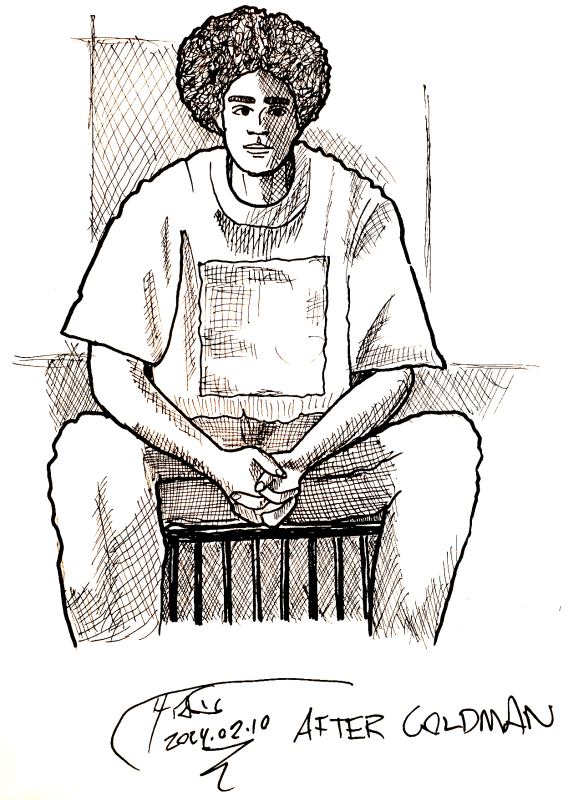
Another Goldman study. Drawing every day.
-the Centaur

This is your periodic reminder that we may not be on the moon, but we live in a pretty awesome world, where almost every movie, book or comic book you ever wanted is either available to stream over the air or can be readily shipped to your home, genre toys that once were inaccessible are now readily available, and we can shrink a playable Galaga machine down to the size you can put it on your coffee table.
We've got it good. Don't screw it up.
-the Centaur
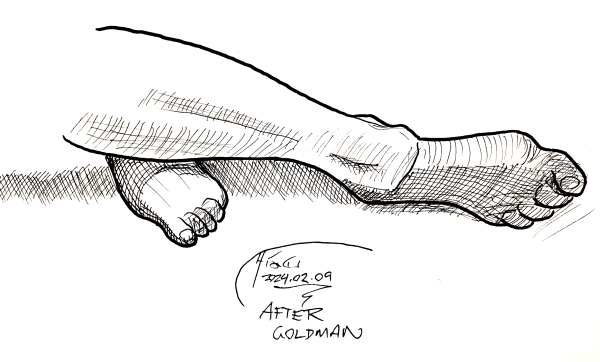
Even more Goldman studies.
Drawing every day.
-the Centaur
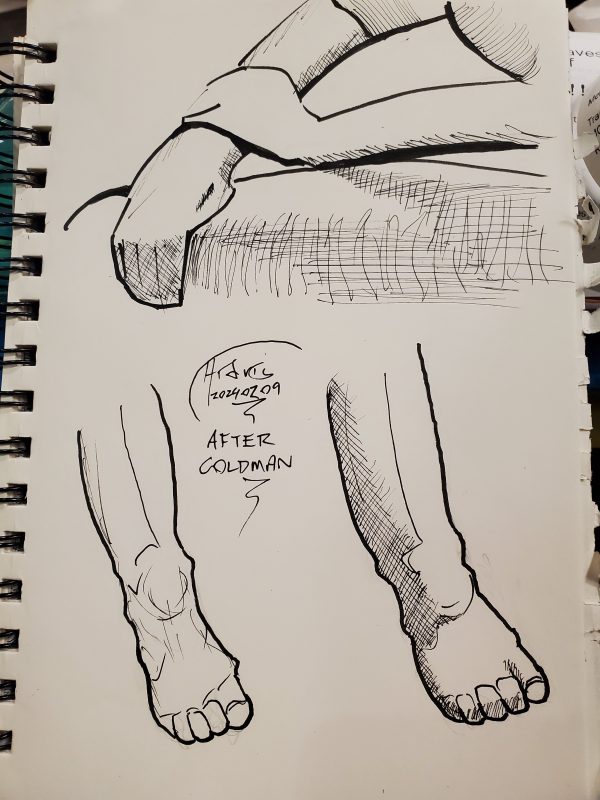
As it says on the tin. More when the Internet is back up.
-the Centaur
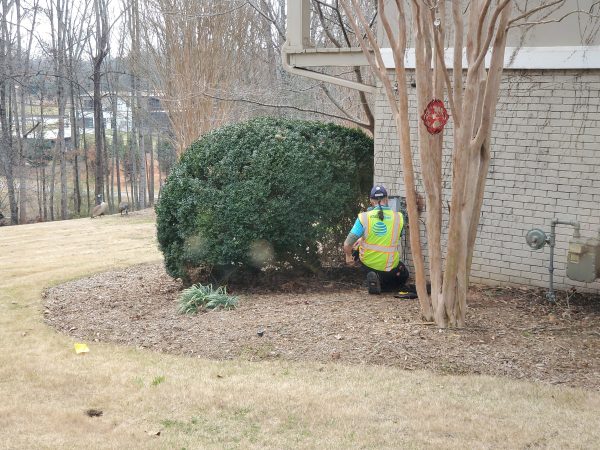
Mt internet has been flakey, so I chatted with an AT-AT Druid online about it and they unexpectedly had a free repair tech slot the next morning. Send them? Yeah baby yeah!
After some kerfuffle with the confirmation, we got it scheduled and they showed up at 830 this morning only to find ...
The internet box half ripped off the house and the beginnings of what looked like a squirrel's nest in it.
Remember, folks, step one of network debugging is to check layer one of the stack: your physical equipment. "Your wires are loose" is the network equivalent of "Ain't got no gas in it" from Sling Blade.
So, hopefully, regular blogging will resume soon. Till then, enjoy this lovely blog post thumb-crafted on my phone.
-the Centaur

Sometimes when I'm behind I shoot for a relatively minimal breakfast: a grapefruit or half pummelo, some toast, maybe some grits or vegan yogurt. I enjoy breakfast, even though I don't generally eat a full three meals a day: for some reason, since I've been out on my own, I've gravitated to two full meals (brunch and dinner) and the occasional midnight snack of milk and pound cake if I'm not too full.
But the "read and eat" ritual remains important, whether I do it two or three times a day. Unless I'm eating with others, or am in the middle of some absolute emergency, I always have a book with me when I eat --- to the point that I have a stand set up to read at the breakfast table. The current top-of-the-stack books are "Pattern Recognition and Machine Learning" for the late-night reads and "Unmasking Autism" for the daily reader (along with "GANs in Action" for a project at work, and various books for writing reference).
Even if your meals are quick and minimal, you can read a few paragraphs while you eat, and hopefully enjoy it. And, if you're persistent, you can get through enormous books this way ... like "A New Kind of Science" or "Machine Vision" or "Probability Theory: The Logic of Science", three long books that I ate, one bite at a time, mostly over breakfast and midnight snacks, a page or even a paragraph at a time, until, at long last, one more mountain was climbed.
-the Centaur
Pictured: Half a pummelo, two slices of toast, and "Unmasking Autism".
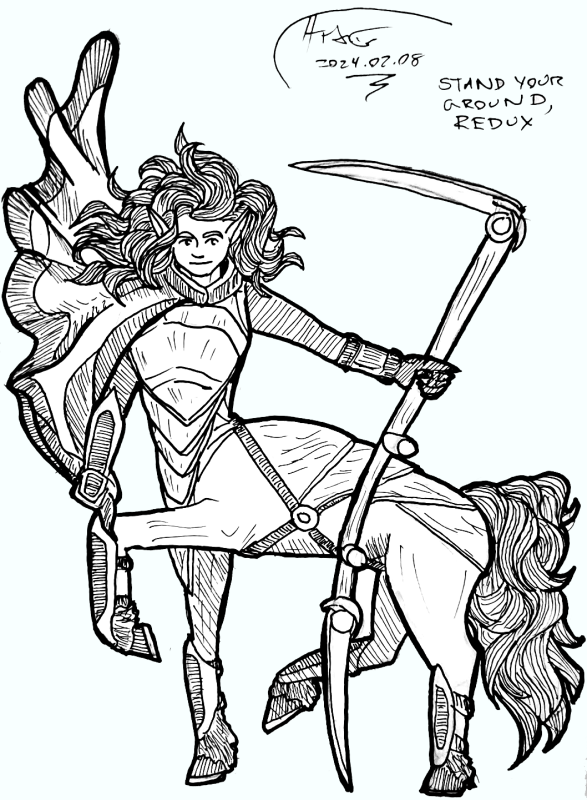
This time, I'm using one of my own drawings as a reference, the old "Stand Your Ground" t-shirt image, for which I recently found a scan of the original art from WAY back in the day (the scan was a BMP, !):
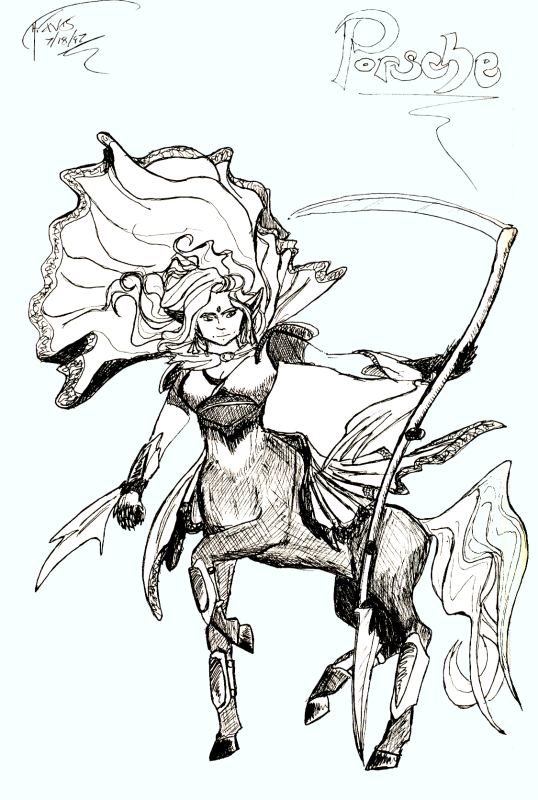
This is from 1997 (!). In some ways it's cruder; in other ways it benefits from the larger aspect ratio (I suspect this was done on 8.5x11 paper, or even larger). But my little notebook has been helping me draw every day:

And so: drawing every day. Onwards.
-the Centaur (the author one)